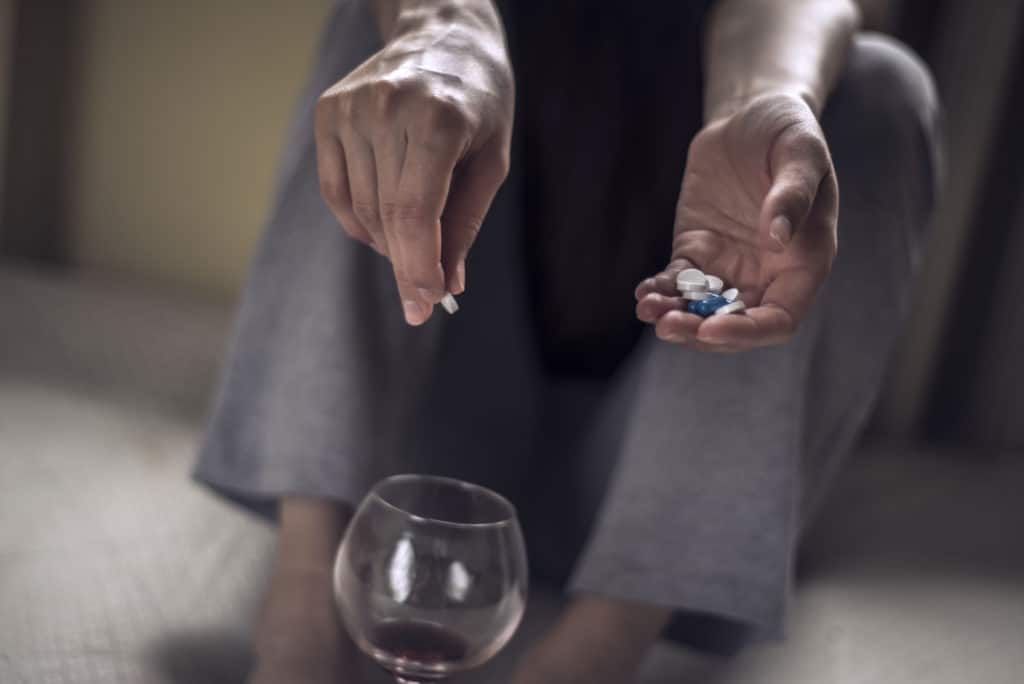Melatonin and alcohol overview
If you take melatonin, it’s best to take it with no alcohol in your body or a long time after you’ve had any alcoholic drinks. Depending on how much you’ve had to drink, wait 2-3 hours before taking melatonin as a sleep aid.
Melatonin is a hormone that your body naturally makes to help keep your sleep cycle consistent. This cycle is also known as your circadian rhythm. This is also sometimes called the “biological clock.” Melatonin plays a major role in maintaining your sleep cycle. Your body produces most of it in the hours after the sun goes down. Most of it is made especially between 11 p.m. and 3 a.m.
Melatonin is also available as a nutritional supplement. You can buy it at almost any pharmacy or drugstore that sells supplements or medicines. It’s often recommended as a sleep aid or as a quick fix for jet lag or insomnia.
Why you shouldn’t combine melatonin and alcohol
Even though alcohol is a sedative that can make you feel sleepy after a few drinks, it’s known to reduce the amount of melatonin that your body can create. This can interrupt your sleep cycle. Alcohol can also cause some of the muscles around your airways to work differently and affect your breathing. This can make it hard to sleep if you have a breathing issue, such as sleep apnea.

Because combining melatonin and alcohol can cause negative side effects to your health, it’s not recommended. Some of these side effects can be disruptive or potentially dangerous, such as:
- Drowsiness: which can make it much harder for you to drive or focus on certain tasks
- Dizziness: which can make driving or even walking around dangerous
- Increased anxiety: which can make you feel irritable or raise your blood pressure
Complications of melatonin and alcohol consumption
Combining melatonin and alcohol can affect your liver’s ability to create certain enzymes. The following complications may also result:
- Flushing in your face and upper body
- Swelling in your feet and ankles
- An abnormally fast heartbeat
- Trouble focusing or thinking clearly
- Feeling abnormally cold or shivering with no clear cause
- Trouble breathing
- Passing out
See your doctor if you experience any of these side effects when combining melatonin and alcohol. If you’ve been having insomnia or sleeping inconsistently, talk to your doctor before taking melatonin supplements as a sleep aid. Your doctor may decide that melatonin isn’t the best solution for your sleeping issues. In the case that you have a sleep disorder, other medications or treatments may be more effective in helping you sleep better at night.
How to take melatonin for best results
Supplements come in doses from 1 milligram (mg) to 10 mg. Talk to your doctor about what dose works best for you and your body’s metabolism. Doses used to help you sleep are usually between 0.1 mg and 5 mg. Dosage will change depending on health issues, age, reasons for taking it, and length of time taking it. It is difficult to pinpoint the exact dosage for each person because melatonin is not regulated by the U.S. Food and Drug Administration (FDA). Dosage can also vary by brand. Here are some general guidelines for taking melatonin:
- Many doctors and nutritionists recommend taking melatonin about 30 minutes before you plan to go to bed.
- There are different ways to consume melatonin. Tablets are the most widely available type in stores. Melatonin has also been added to some food and beverage products. But tablets are the safest, most effective way to get melatonin into your system.
- After taking a melatonin supplement, avoid activities that expose you to “blue light.” These activities include watching television or using a mobile device like a smartphone. This type of light can cause your body to produce less melatonin because of the brightness of these screens. It can also make a supplement less effective.
- If you’re taking a melatonin supplement to help you get to sleep, avoid alcohol after you’ve taken the supplement. Many melatonin supplements are time-release. This means that they take some time to begin working. Many of them begin working about 30 minutes after you’ve taken them. Having an alcoholic drink interrupts this process and can make the supplement not work as well.
Risks and side effects of melatonin
Melatonin supplements don’t carry a lot of risks or negative side effects. Most of the time, in controlled doses, melatonin won’t have any noticeable effects on your body or sleep cycle. Buy from a reputable source, because melatonin supplements are not standardized in processing or packaging. Melatonin is not monitored by the FDA for purity, safety, or effectiveness. Always have in mind to not take melatonin and alcohol together.

Melatonin can have some risks in its interactions with some prescription drugs, including:
- Diabetes medications
- Medications for the immune system (immunosuppressants)
- Blood thinners
- Birth control
Some possible side effects of melatonin supplements include:
- Disruption of your sleep cycle, which may be especially discomforting if you work a night shift or have maintained the same sleep habits for a long time
- Feeling sleepy or groggy during the daytime, sometimes long after you’ve woken up
- Abnormal dizziness or disorientation
- Occasional headaches or migraines
- Unexplained but short episodes of depression or depressive feelings
Causes of Alcoholism
It is common to think this condition arises from a person who simply does not know how to control their alcohol consumption and is trapped in a vicious circle, but according to the scientific piece ‘The many causes of Alcoholism’ Cohen, S. Published on the Drug Abuse & Alcoholism Newsletter, there are three main causes of alcoholism disease: biological, physiological, and sociocultural.
- Biological causes may be:
- Genetic: “inherited susceptibility to alcohol’s acute effects, impaired ability to catabolize ingested alcohol, or difficulty in dealing with anxiety, frustration, and depression”.
- Biochemical: sensitivity to insulin, episodes of spontaneous hypoglycemia, or adrenal insufficiency.
- Or endocrine: persistently low levels of androgenic hormones.
- Among the psychological causes of Alcoholism are:
- Need for tension relief and anxiety control
- Personality disorders
- Psychodynamic factors
- Learning: tension reduction from drinking provides a positive reinforcement to continue drinking
- Role modeling: peer example or occupational pressures
- Culture-specific drinking traditions, and those stresses and conflicts experienced by certain subcultures also contribute to overindulgence in alcohol
Alcohol’s Effects on the Body
The effects of a drink of alcohol can vary a lot from one person to the next, but it usually takes about an hour for your body to metabolize one drink. Alcohol stays in the body for different periods depending on how much you drank, your body weight, and your sex. Factors that influence how quickly alcohol leaves the system include your age, height and weight, and amount of food in your stomach at the time you drink.
But Alcoholism can affect multiple organs of the body, including the brain, heart, liver, pancreas, and even the immune system.
- Brain: alcohol interferes with the brain’s communication pathways, and can affect the way the brain looks and works. These disruptions can change mood and behavior, and make it harder to think clearly and move with coordination.
- Heart: drinking a lot over a long time or too much on a single occasion can damage the heart, causing problems including:
- Cardiomyopathy – Stretching and drooping of heart muscle
- Arrhythmias – Irregular heart beat
- Stroke
- High blood pressure
- Liver: Heavy drinking takes a toll on the liver, and can lead to a variety of problems and liver inflammations including:
- Steatosis, or fatty liver
- Alcoholic hepatitis
- Fibrosis
- Cirrhosis
- Pancreas: alcohol causes the pancreas to produce toxic substances that can eventually lead to pancreatitis, a dangerous inflammation and swelling of the blood vessels in the pancreas that prevents proper digestion.
- Immune System: drinking too much can weaken your immune system, making your body a much easier target for disease. People who drink chronically are more liable to contract diseases like pneumonia and tuberculosis than people who do not drink too much. Drinking a lot on a single occasion slows your body’s ability to ward off infections – even up to 24 hours after getting drunk.

Alcoholism Treatment
When it comes to Alcoholism treatment, it is normal to think of 12-step programs or 28-day inpatient rehab, but it becomes difficult to think of more options of treatment for this condition. There are a variety of treatment methods currently available. According to the National Institute on Alcohol Abuse and Alcoholism, there are three types of treatment:
- Behavioral Treatments for alcoholism: are aimed at changing drinking behavior through counseling. They are led by health professionals and supported by studies showing they can be beneficial.
- Medications for alcoholism: Three medications are currently approved in the United States to help people stop or reduce their drinking and prevent relapse. They are prescribed by a primary care physician or other health professional and may be used alone or in combination with counseling.
- Peer-Support Groups for alcoholism: Alcoholics Anonymous (AA) and other 12-step programs provide peer support for people quitting or cutting back on their drinking. Combined with treatment led by health professionals, mutual-support groups can offer a valuable added layer of support. Due to the anonymous nature of mutual-support groups, it is difficult for researchers to determine their success rates compared with those led by health professionals.
Reclaim Your Life From Melatonin And Alcohol
Because combining melatonin and alcohol can cause negative side effects to your health, it’s not recommended. If you suffer from alcoholism, stopping drinking may be a challenge, even if that involves your wellbeing. We Level Up California can provide you, or someone you love, the tools to recover from alcoholism with professional and safe treatment. Feel free to call us to speak with one of our counselors. We can inform you about this condition by giving you relevant information. Our specialists know what you are going through. Please know that each call is private and confidential.